On the Yamuna (May 26, 2007)
“The dirt below is making the bubbles. This is not from fish,” says 36-year-old Lalla Navwalla (Lalla Boatman). Everyone working on the banks of the Yamuna river opposite the big bus station proffers the same last name. (Listen, mp3 file, 50 seconds, 800KB, Hindi, See English translation here) Lalla, who has worked these waters his whole life, is not afraid of what lurks in it. His father was a sweetmaker but in his youth he learned to swim, abetted by friends, and has made his money since then diving for coins or other valuables tossed by Hindu pilgrims into this river and by rowing people here and there, between little shrines dotted on the banks of the river.
“I go in at ten and come out at five,” he said, gesturing towards his younger brother who is in the water up to his neck. On a good day, the two of them might bring out 150 rupees from the waters, maybe a little silver or gold as well. “It used to be easier before. You could see a coin 20 feet down,” he said as he rows the blue wooden rowboat, his scrawny arms and face straining with the effort. It seems hard to believe. Now it is not possible to gauge even what is happening an inch below.
This past week he rowed a boat for the police who were looking for a head that a serial killer claimed to have tossed into the Yamuna. The story was in all the papers. An ex-convict miffed at what he claimed was wrongful incarceration had been leaving headless torsos outside the city’s Tihar Jail. Two days ago the head washed onto the Yamuna’s banks, Lalla said. “Dogs were at it. It was just a shell. The inside had been cleaned out,” he said. That was not in the papers. After a bit he opens a package of pan masala, pours the powdery contents into his mouth, tosses the little foil packet aside. As we row along I see glimpses of life along the backside of the neighbourhoods that line Ring Road, which encircles the city. The buildings are older and prettier than most of the 1950s squat boxes that mark the rest of Delhi. They have little fretwork windows, pillars, are painted shades of pastel. Outside some, potted plants line the steps that lead down to the waters. Some of these buildings are old bath houses, others are wrestling camps. Outside the camps, scores of young men bath, horse around, dive. In others holy men live, to be close to the water they revere, even now, even in its current state.
Strange to think that tainted as they are, these waters still give a breath, a pause, a respite from the hustle-bustle of everyday city life. Sometimes from afar, from a brige that crosses Yamuna, the horns that are welded to every moment of Delhi’s existence can be heard. But mostly it is the ripple and flow of the water, the clunk of the oar, the creak of the old boat that is heard here. It won’t last long. On Thursday the Indian Express reported that the city’s development agency had given “the nod” to a facelift for the Yamuna river front, with camping grounds, a biodiversity (?) park and food courts planned. Bulldozers will come to the people I've seen today and they, as others, will make way. May 21, 2007
I would call. They would put me on hold for 20 minutes then a recorded voice would tell me all lines were busy and to leave a message. The message box was invariably full. I would speak to the secretary of the general manager to whom I faxed the letter and she would insist he picks up his own faxes (?!) so she had no way of knowing if mine had come in yet or not. And by the way, he was out. I called the Russia head office and they told me I had called the wrong department. But they didn’t happen to know the number of the department I should call and so I should call back to Russian directory assistance. And so on. (I exaggerate only very slightly.) For good measure I also wrote the Delhi airport since I remember the screening staff asking a great many questions about the bag the was broken into, for security purposes I thought. If traveling through Delhi, do not put anything you value in your checked baggage and if the screening staff seems very interested in any item in your baggage you better take it out and keep it with you. All this makes me very sorry for an Italian man I met the other day who says he is trapped between the Russian, Indian and Italian bureaucracies. He is Italian, his wife Russian and the baby born in India. After the baby was born the Indian authorities started asking how come the baby was in the country with no passport or visa. So then he had to try and get a passport for the baby. But the Russian authorities said they have no dual citizenship with India – to their mind the baby was Indian since it was born here although it doesn’t qualify as Indian without Indian parentage or seven years of residency while paying taxes. Eventually they got the baby put on the mother’s passport and went to Russia. But then the Russian authorities took away that passport when the mother went to renew it – it was due to expire – and said the Russian embassy had made a mistake to include the baby on it in the first place. Then when the couple tried to return to India they were told they couldn’t take the baby out of the country since it has no passport.
Oh, and by the way, on the way back I didn’t put anything valuable in my suitcase and again when I arrived the lock was broken (actually the zip) and all my stuff was rifled through and my letters -- including one containing pictures of my one-year-old niece -- and cards torn up. They’re playing with me. |
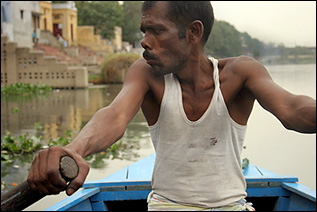 The
opaque gray water bubbles like a vat of chemicals being brewed up
by the evildoer in a children’s cartoon. These are not those
bubbles that speak of some life stirring below the surface. These
are the bubbles of water pestilent with chemicals, with shit, with
all manner of debris that is human in creation.
The
opaque gray water bubbles like a vat of chemicals being brewed up
by the evildoer in a children’s cartoon. These are not those
bubbles that speak of some life stirring below the surface. These
are the bubbles of water pestilent with chemicals, with shit, with
all manner of debris that is human in creation.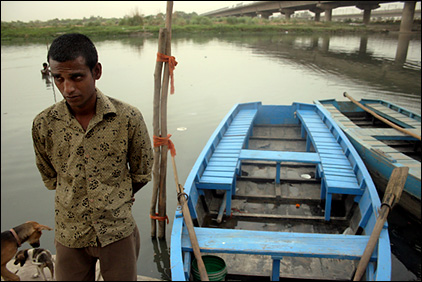 Even
today (Friday, May 25), as he rows me a kilometer or two
so that I can look first-hand at the water, we see people bathing
all along the water’s edge. Lalla says some days he might
spend as many as eight hours in the water – full work day.
Even
today (Friday, May 25), as he rows me a kilometer or two
so that I can look first-hand at the water, we see people bathing
all along the water’s edge. Lalla says some days he might
spend as many as eight hours in the water – full work day.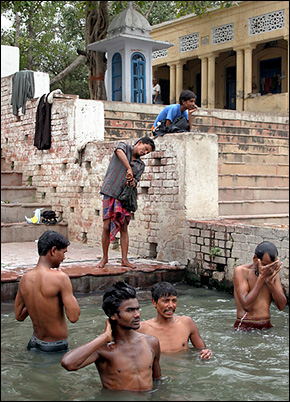 “You
have to feel your way with your hands or feet. You might encounter
a corpse or some body parts,” he says expressionlessly.
“You
have to feel your way with your hands or feet. You might encounter
a corpse or some body parts,” he says expressionlessly. 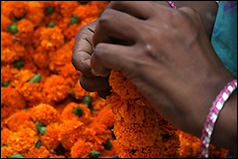 Elsewhere
women string together brightly coloured marigolds into garlands
to be taken to temples to be used in worship. Mourners burn their
dead on the riverbank – one pyre is festooned with Nepali
prayer flags.
Elsewhere
women string together brightly coloured marigolds into garlands
to be taken to temples to be used in worship. Mourners burn their
dead on the riverbank – one pyre is festooned with Nepali
prayer flags.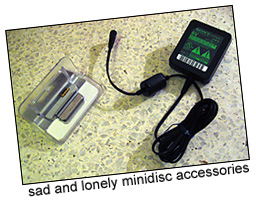 Never,
but never, will I travel a Russian airline again. After all the
jolly times in Moscow airport, I arrived in New York to find that
the lock on my suitcase had been broken and someone had extracted
my phone, charger and minidisc recorder (Yes, I know you’re
not supposed to put electronics in checked baggage. It was a 4.30
a.m. flight. I was a little distracted.) all without breaking the
wraparound security belt put on after the x-ray screening in Delhi.
When I called Aeroflot to report this they said that if I was supposed
to unpack and report the theft at the airport. Or else they couldn’t
help me. I decided to embark on a complaint-letter writing exercise
(see partially-edited text
Never,
but never, will I travel a Russian airline again. After all the
jolly times in Moscow airport, I arrived in New York to find that
the lock on my suitcase had been broken and someone had extracted
my phone, charger and minidisc recorder (Yes, I know you’re
not supposed to put electronics in checked baggage. It was a 4.30
a.m. flight. I was a little distracted.) all without breaking the
wraparound security belt put on after the x-ray screening in Delhi.
When I called Aeroflot to report this they said that if I was supposed
to unpack and report the theft at the airport. Or else they couldn’t
help me. I decided to embark on a complaint-letter writing exercise
(see partially-edited text 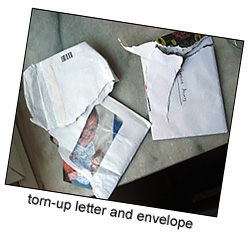 All
this makes me feel like there must be some sort of a career opportunity
in being a professional complainer. In the sense, the number of
complaints I have to make or letters I have to write has risen so
sharply since I moved here that I have a huge backlog. And I assume
it must be the same for other people. But how would it work? You
couldn’t peg your pay to the actual extraction of recompense
because that would make it too risky a business. But people don’t
really expect to get recompense when they write or call to complain
do they? It’s rather that they want to harass someone to the
same extent they’ve been harassed. So perhaps you would draw
up a contract where you would charge according to the number of
hours you manage to tie up some company representative listening
to your long and boring complaint or to the number of written responses
you got from the company.
All
this makes me feel like there must be some sort of a career opportunity
in being a professional complainer. In the sense, the number of
complaints I have to make or letters I have to write has risen so
sharply since I moved here that I have a huge backlog. And I assume
it must be the same for other people. But how would it work? You
couldn’t peg your pay to the actual extraction of recompense
because that would make it too risky a business. But people don’t
really expect to get recompense when they write or call to complain
do they? It’s rather that they want to harass someone to the
same extent they’ve been harassed. So perhaps you would draw
up a contract where you would charge according to the number of
hours you manage to tie up some company representative listening
to your long and boring complaint or to the number of written responses
you got from the company.